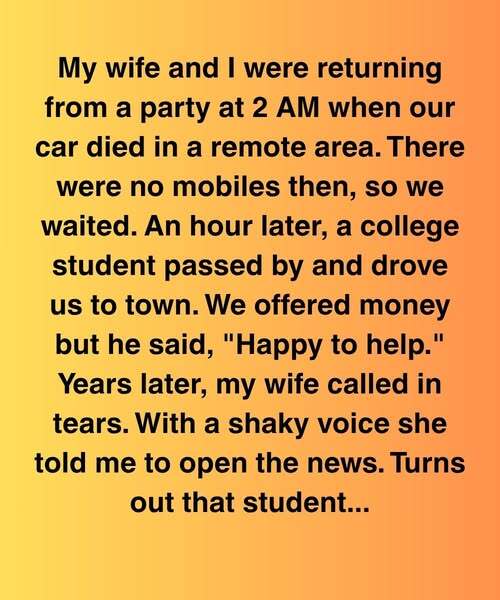It was 2 a.m. on a moonlit highway, the kind of lonely stretch where time slows and sound seems to disappear. My wife, **Amrita**, and I were driving home from a friend’s party when our old sedan coughed twice and gave up for good. No cell phones. No passing cars. Just silence, the faint hiss of cooling metal, and the stars burning above us.
“Need a lift?” he asked, voice steady and calm.
We offered him gas money, but he shook his head. “Happy to help,” he said with a smile.
He drove us to town, chatting easily about his classes and his part-time job at a tutoring center called **Bright Steps Learning Center**. He said he helped underprivileged kids at night to pay for college. His name was **Zayd**. When we reached the diner, he wished us well and disappeared into the night.
We never saw him again — or so we thought.
### The Face on the News
Years later, Amrita called from the kitchen, trembling. “Turn on the TV,” she said.
And there he was — older, sharper, standing behind a podium, cameras flashing. The headline read:
**“Former Foster Child Turned Harvard Graduate Elected Mayor Against All Odds.”**
It was Zayd Nouri. The same young man who had rescued us that lonely night.
As pride swelled, something else crept in — unease. Amrita’s voice cut through my thoughts. “Do you remember what happened after that night?”
I did. Too well.
A few weeks after our car broke down, I had filed a **zoning complaint** for safety violations against a small tutoring center in the Old Market District. Fire hazards. Poor ventilation. It was routine paperwork. Nothing personal.
But the name of that center was **Bright Steps**.
I froze. “Oh no.”
Amrita looked at me, horrified. “He worked there. That was his place.”
The realization hit hard — that my small bureaucratic action might have shut the doors on someone’s dream.
### “I Remember You.”
Days later, we watched Zayd’s acceptance speech. His tone was calm, his words deliberate.
“To those who believed in second chances — I remember you.
And to those who shut doors — I remember you, too.”
No bitterness. Just truth. And grace.
That single line haunted me. For me, it had been just another file. For him, it may have been the obstacle that changed his life’s path.
### The Meeting
A week later, I attended his first public meet-and-greet, nervous but determined. When I reached the front of the line, he looked at me for a long moment. Then he smiled.
“You look familiar,” he said.
I swallowed. “We met once — you helped us when our car broke down on Route 9.”
His eyes lit up. “You were that couple! I’ll never forget that night. Funny thing — I was ready to give up on everything. But after I dropped you off, I thought, maybe doing good does matter. That moment kept me going.”
I hesitated, then confessed. “I think I wronged you later. I worked in zoning — I shut down Bright Steps.”
He paused, thoughtful. “You probably weren’t wrong. The place had issues. We were kids trying to do too much with too little.”
“I’m sorry,” I said quietly.
He nodded. “Don’t be. Sometimes a closed door leads to the right one. If Bright Steps hadn’t ended, I might never have left. Never gone to Harvard. Never found my purpose.”
Then, gently, he added: “I don’t hold grudges. But I do remember — because remembering helps you grow.”
### What Redemption Looks Like
That night changed us. Amrita and I started volunteering — tutoring foster kids, mentoring students, helping job seekers. Not as penance, but as a way to keep his lesson alive: that every act, no matter how small, leaves a mark.
Six months later, we were invited to **City Hall** for Zayd’s new initiative — *Rebuild Roots*, a program for foster youth and struggling families. During his speech, he scanned the audience and smiled.
“I want to thank two people who may not realize the impact they had on me,” he said. “Their kindness — and even their mistakes — shaped who I am today.”
He gestured toward us. The crowd applauded. My throat tightened as Amrita squeezed my hand.
We didn’t deserve his gratitude — but we understood his forgiveness.
Because redemption isn’t about erasing the past. It’s about honoring it by living differently.
And on that night, I realized: the young man who once gave us a ride home in the dark was now leading others toward the light.
Sometimes, the smallest act of kindness — or the smallest lapse in compassion — can echo across years.
And sometimes, grace finds a way to circle back, when you least expect it.

Leave a Reply